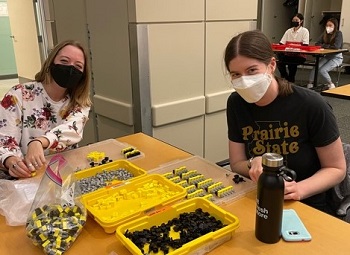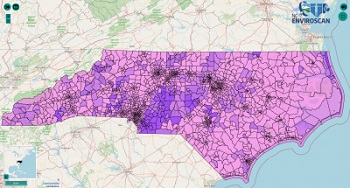Superfund Research Program
March 2022

Throughout the COVID-19 pandemic, NIEHS Superfund Research Program (SRP) teams have shown resourcefulness, updating existing projects and pursuing new research to address environmental health needs.
Below are a few examples of creative approaches that SRP programs have taken to navigate the public health crisis.
Building Environmental Literacy
When community volunteers were unavailable during the pandemic, trainees with the Massachusetts Institute of Technology (MIT) SRP Center jumped in to help assemble components of 3D protein models for educational use.
The models are one of several biology sets produced through a collaboration among the SRP Center, the MIT Edgerton Center, and the MIT Center for Environmental Health. The trainees snapped together pieces to form amino acids, the molecules that make up proteins. By connecting amino acids to form chains, students can explore protein structure and function.
"The SRP trainees stepped up and completed 5,040 amino acids - quite a feat," said Katheen Vandiver, Ph.D., director of MIT's Community Engagement Core. "In the process, these masked heroes also learned about a new way to teach molecular biology."
Other modeling sets include materials to learn about DNA and types of RNA and their roles in protein synthesis. Instructional booklets for basic and advanced learning come with the kits, facilitating their use in middle and high schools, as well as in universities and professional institutions. Indeed, the team recently published a study showing that nurses who worked with the models reported a greater understanding of genetic susceptibility to disease.
Tracking COVID-19 Trends

Using supplemental SRP funding, the University of North Carolina at Chapel Hill (UNC) SRP Center worked with the Institute for Environmental Health Solutions and the Renaissance Computing Institute to incorporate COVID-19 statistics into a new web-based tool.
Called North Carolina (NC) ENVIROSCAN, the resource enables the public and experts alike to explore trends in toxic chemicals, social stressors, and disease through interactive maps.
For example, a user can home in on a particular location to see how key measures of environmental health, such as arsenic levels, correlate with social and demographic variables, including race and poverty; environmental justice factors, like traffic; and COVID-19 cases and deaths, among other data.
"It is our hope that NC ENVIROSCAN will promote routes to healthy environments in our state by providing a comprehensive and user-friendly way to view and compare individualized data based on community needs," said UNC SRP Center Director Rebecca Fry, Ph.D., in a UNC news release.
Designing New Air Filters

At the University of Kentucky SRP Center, researchers led by Dibakar Bhattacharyya, Ph.D., explored a novel approach to filtering coronavirus particles from air.
They showed that hollow fiber membranes - tiny, porous tubes also common in water purification technology - efficiently filtered synthetic mimics of the coronavirus from air over a period of two days.
As a more accurate test of performance, the researchers also exposed the membranes to a harmless virus with similar properties to the coronavirus. The devices excelled at filtering the particles, even at concentrations higher than what someone would typically encounter in daily life.
"These membranes are a highly cost-effective and convenient option for removing viral particles from air," said Bhattacharyya. "They could be useful for public businesses, such as restaurants and gyms, to minimize the spread of COVID-19 and other respiratory illnesses."
The SRP Special COVID-19 Supplements and Activities provides more details on projects designed to address the pandemic.


